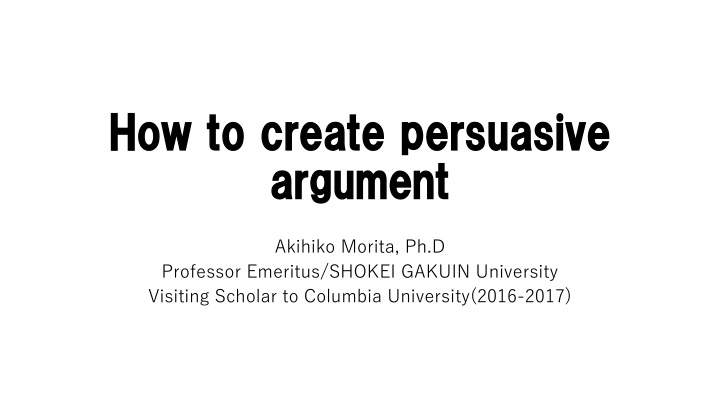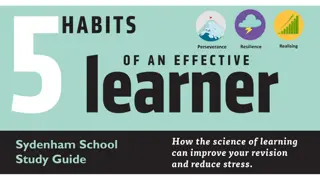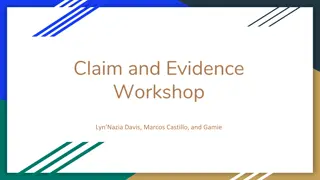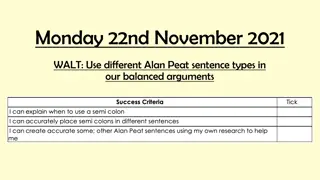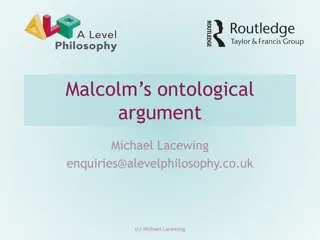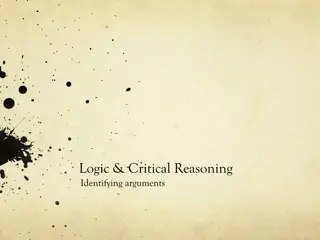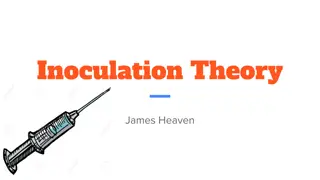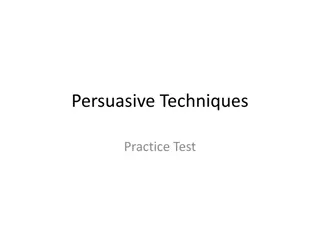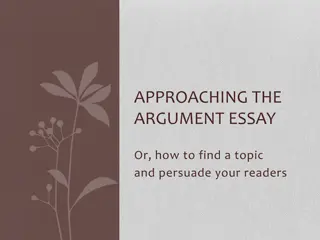Creating Persuasive Arguments: A Strategic Approach
Crafting a persuasive argument involves fixing the scope, identifying the target audience, leveraging powerful references, and structuring your points effectively. Exploring the dynamics of energy policy in the context of democracy and socio-technological systems, this paper challenges conventional thinking and advocates for a reexamination of political ideals in East Asia. Drawing from influential works like Alvin Toffler's "The Third Wave," it emphasizes the importance of democratic decision-making and ecological perspectives in modern discourse.
Download Presentation

Please find below an Image/Link to download the presentation.
The content on the website is provided AS IS for your information and personal use only. It may not be sold, licensed, or shared on other websites without obtaining consent from the author.If you encounter any issues during the download, it is possible that the publisher has removed the file from their server.
You are allowed to download the files provided on this website for personal or commercial use, subject to the condition that they are used lawfully. All files are the property of their respective owners.
The content on the website is provided AS IS for your information and personal use only. It may not be sold, licensed, or shared on other websites without obtaining consent from the author.
E N D
Presentation Transcript
How to create persuasive How to create persuasive argument argument Akihiko Morita, Ph.D Professor Emeritus/SHOKEI GAKUIN University Visiting Scholar to Columbia University(2016-2017)
Seven steps to create persuasive argument Seven steps to create persuasive argument 1. Briefly fix the scope of what you want to say in your paper 2. Identify whom you want to persuade 3. Find out the most powerful reference for your argument 4. Study the reference while creatively and openly generate your points of argument 5. Design your argument preliminarily 6. Start writing, not hesitating to make major changes on the way 7. After complete writing, make sure your quotations correct for avoiding plagiarism
My paper My paper Heavenly Principle( Heavenly Principle( Law Law , Human Sentiment/Compassion Sentiment/Compassion and Nuclear Policy in and Nuclear Policy in East Asia East Asia translated and published by the translated and published by the The Chinese Academy of Social Chinese Academy of Social Sciences Sciences ), State ), State , Human The
My major line of argument My major line of argument Energy policy is highly political, and we must take it as major challenge for our democracy because political decision-making in a liberal democracy must be democratic. Complex socio-technological systems such as nuclear energy plants need a new approach, and Tokyo Electric Power Company (TEPCO) s Fukushima nuclear accident should not be taken as a special instance of failure for which TEPCO alone was responsible, but rather as a representative repercussion of Third Wave civilization. We need to shift from an anthropocentric view to an ecological and informational one, which forces us to reexamine the modern scientism that originated in the West. To do so we need to reexamine the way of thinking unconsciously embedded as a de-facto framework in our mind, a framework internalized through a process of modernization for which the West was the paradigm influence. Heavenly Principle, State Law, Human Sentiment, the East Asian political ideal is worth reexamining as entry point for such enterprise.
Whom I intend to address Whom I intend to address Chinese scholars/political leaders Political/legal philosophers and political scientists in East Asia
Powerful references Powerful references Alvin Toffler(1928-2016), The Third Wave(1980)
Powerful references Wan Hui A professor in the Department of Chinese Language and Literature, Tsinghua University, Beijing. One of the leading scholars and opinion leaders in China. translated by Michael Gibbs Hill, China from empire to nation-state, (Harvard University Press, 2014)
